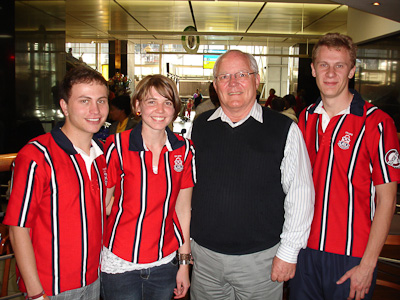Latest News Archive
Please select Category, Year, and then Month to display items
![]()
After South Africa’s battle with the record-breaking drought of 2015, Prof Andries Jordaan from our Disaster Management Training and Education Centre for Africa(DiMTEC) saw room for improvement in dealing with this kind of disaster.
Drought impact
Commercial farmers who are usually net exporters of food crops and communal farmers who own the bulk of the country’s livestock, were all hit hard in 2015. Most of the latter had no resources to spare as the drought progressed. The concern about the drought’s impact on the country’s food production and availability resulted in a joint goal of preventing food scarcity during future droughts.
Prof Jordaan’s visit to the National Drought Mitigation Center (NDMC) in Lincoln, Nebraska, in the US, several years ago prepared him to better equip communities in South Africa to deal with drought situations. “I recognised that in spite of the impact DiMTEC has been able to make on disaster preparedness, a gap remained in disaster response in South Africa.”
Sharing knowledge
In August this year Prof Jordaan again visited the NDMC. This time he requested a few key players in South Africa’s agriculture and disaster response communities to join him. With him were Janse Rabie, head of Natural Resources at AgriSA, a nonprofit organisation that functions as an interface between the government and about 28 000 South Africa farmers, and Moses Musiwale Khangale, director of Fire Services for the South African Ministry of Cooperative Governance and Traditional Affairs.
The South African delegation met with and learnt from climatologists, geospatial technologists, and outreach and planning analysts.
Kovsies still enjoy successful exchange opportunity
2010-08-25
 |
| Students Ian Botha, Lize Swart and SW Meintjies with Prof. Izak Groenewald (second from right) at the O.R. Tambo International Airport in Johannesburg upon the student’s recent departure to Virginia Tech. Photo: Supplied |
More than a decade ago, the then Chairperson of Free State Agriculture, Piet Gous, in collaboration with the then Dean of the Faculty of Natural and Agricultural Sciences at the University of the Free State (UFS), Prof. Piet Wilke, started an exchange initiative which still makes a difference to students’ lives today.
Students at the university get the opportunity to go and study at the Virginia Polytechnic Institute and State University (Virginia Tech) in Blacksburg in the United States of America (USA) during the second semester. During the first semester the UFS then receive American students. Since its inception in 1998, 142 students have already participated in the exchange programme.
“It is not only about six months’ studies at an American university. It is about the expansion of horizons, the creation of new frames of reference and exposure to other cultures and customs in order to attain and experience more life capacity,” says Prof. Izak Groenewald, Director of the Centre for Sustainable Agriculture and Rural Development at the UFS. Prof. Groenewald has acted as coordinator of this student exchange programme since 1997.
According to Prof. Groenewald, the secret of the successful programme rests with the fact that Kovsies pay their tuition and accommodation fees at the UFS as if they were studying here. However, they enjoy the privileges at Virginia Tech. Similarly, the American students pay their corresponding fees at Virginia Tech and then enjoy the privileges offered by the UFS.